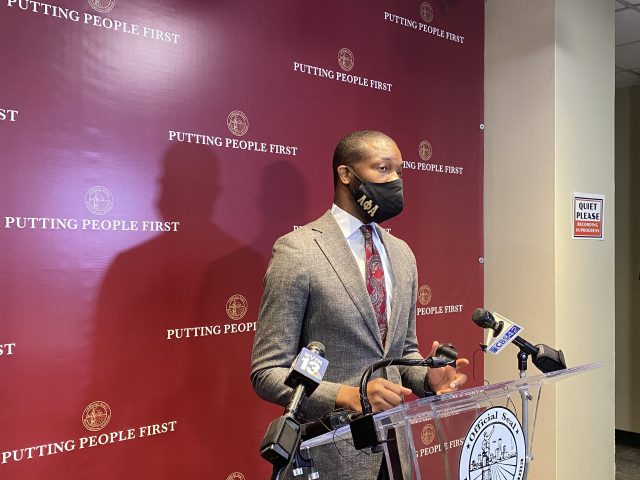By Erica Wright
The Birmingham Times
After a three-month delay due to financial concerns caused by COVID-19, Birmingham Mayor Randall Woodfin on Tuesday unveiled a proposed $412 million FY 2021 budget that addresses a $63 million shortfall with pay cuts for employees and boards and agencies and furloughs for 7% of the city’s workforce.
The budget’s spending priorities also reflect a commitment to investment in neighborhoods, infrastructure and financial sustainability, the mayor said.
The budget normally goes into effect July 1, but with the delay the fiscal year will begin October 1.
The mayor, who said he would take a 10 percent pay cut, told the City Council during its regular meeting that “difficult choices” were needed to balance the revenue shortfalls with essential services for residents.
“These are difficult choices to make,” he said. “Our employees are our greatest asset and we are thankful for their service. But we must remember our duty is to the people who make up the 99 neighborhoods of Birmingham. These actions ensure no reductions take place in the basic services the city provides to the people.”
The cuts were wide-ranging. In addition to the mayor’s pay cut, appointed employees, including those in the mayor’s office employees, will receive pay reductions of 3 percent to 10 percent. Department heads and deputy department heads also face a cut pay.
Also the mayor announced:
- 447 vacant positions eliminated, freeing $15.8 million
- 114 part-time workers furloughed (except city council employees) indefinitely
- 259 full-time culture and recreation center employees furloughed indefinitely
- Holiday pay for nine of the city’s 12 observed holidays suspended
And, the spending plan reduces funding to various non-city boards and agencies by $12.6 million, reduces funding for economic incentives by $1.7 million and find savings in debt restructure by $3.8 million. Under the plan, the city would transfer $23 million from its budget surplus to make up the remaining shortfall.
The proposed budget defunds 447 vacant positions. Removing these vacant positions from the operating budget alone will save $15.8 million, according to the city.
Furloughed employees, Woodfin said, will get to keep their benefits, including health insurance and their pension for at least three months, but the decision was one that he said “hit home.”
“I was a city employee for eight years,” said the mayor, who worked in the city’s law department. “These are people, they have families, lives. It’s heavy, it’s emotionally heavy and its nothing to make a light decision around. We’re going to give our employees an ample notice of when and we’re going to make sure there is enough . . . and make sure the immediate things they need to know is they will not lose their benefits… investments are still there.”
Boards and agencies took a hit. Several received no funding in the proposed budget including Red Mountain Theater; Alabama Symphony; Alabama Ballet; Red Mountain Park; Jones Valley Urban Farm and Vulcan Trail.
City-owned facilities received reductions as well. For example, the Birmingham Civil Rights Institute is proposed for $750,000, which is $250,000 less than the $1 million in the FY20 budget.
With the national conversation around defunding the police, Woodfin wanted to address the police department’s budget in this fiscal year, which, on paper will increase. The department’s budget will increase because the police will receive more funding for equipment.
In addition to that, full-time security workers will now fall under the police department instead of the individual department that security worker is assigned to.
However, the proposed budget for police will eliminate 48 current vacant sworn officer positions as part of the overall effort to eliminate vacant jobs.
City officials said budget’s spending priorities reflect a commitment to investment in neighborhoods, infrastructure and financial sustainability.
“The priority has not changed even in a year that taxes are lowered, the city of Birmingham is still committed to neighborhood revitalization, still significant money being put into paving streets, blight removal, weed abatement and other things,” Woodfin said. “It is important as an administration that we do not deviate.”
The budget proposal contains:
- $10 million for street resurfacing
- $3.5 million for demolition
- $1.25 million for weed abatement
- $300,000 in the Land Bank Authority
- $300,000 for recycling program
- $198,000 for neighborhood associations (neighborhoods receive $2,000 each)
The plan also continues key initiatives including the Birmingham Promise, Birmingham On Demand (VIA), and also prioritizes a deferred maintenance program for city facilities and an investment in the city’s fleet.
“Citizens will continue to see paving of streets, potholes being filled, picking up trash, they will notice more blight removal, weed abatement and grass cutting, they will notice the things they carry about the most,” Woodfin said.
The proposed budget also increases the city’s contribution by $3.8 million to the pension fund for a total contribution of $28.4 million. Within two years, the city has increased its contribution to the pension fund by 70 percent, for a total of 90 percent funding of the actuarially determined contribution.
For more information on the mayor’s proposed budget, visit www.birminghamal.gov/2021budget.
Information and resources are available for city of Birmingham staff at www.birminghamal.gov/furlough.
Updated at 3:59 p.m. and 6:51 p.m. on 8/18/20





